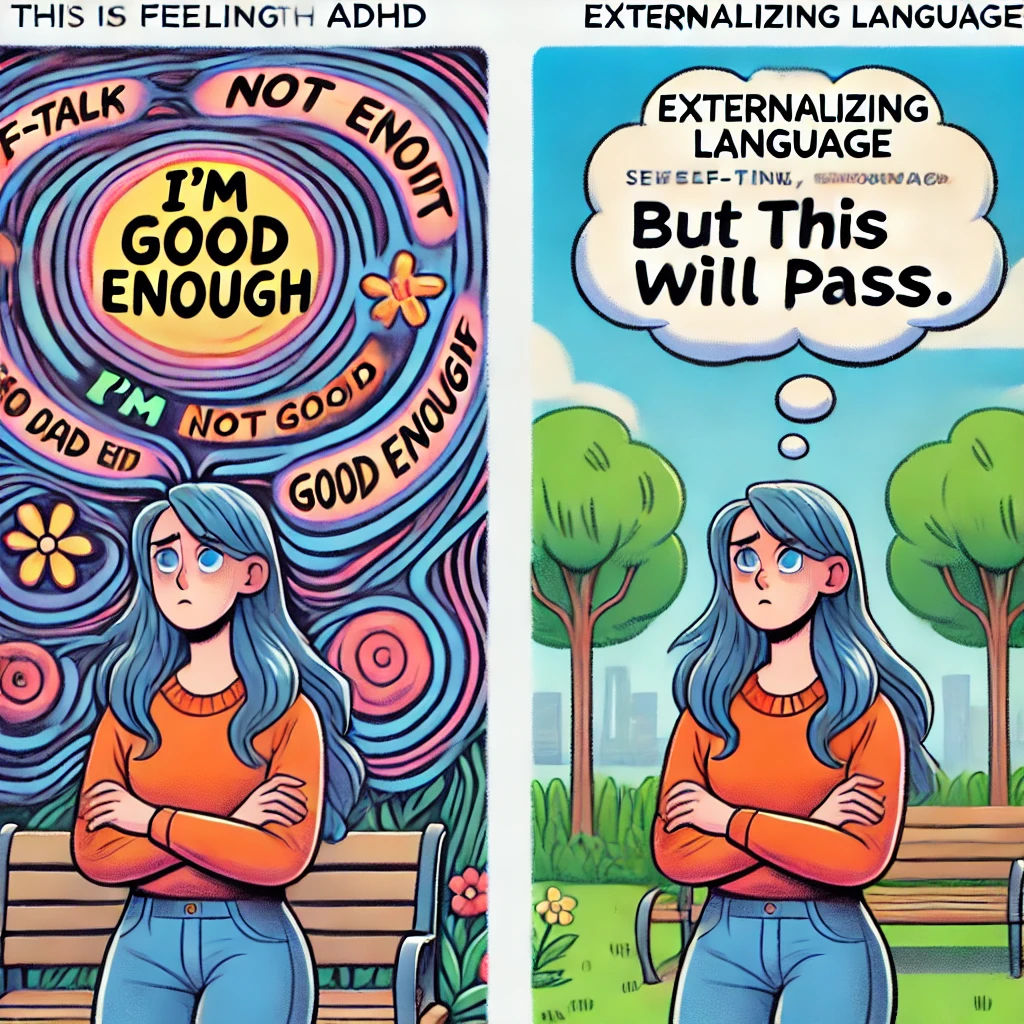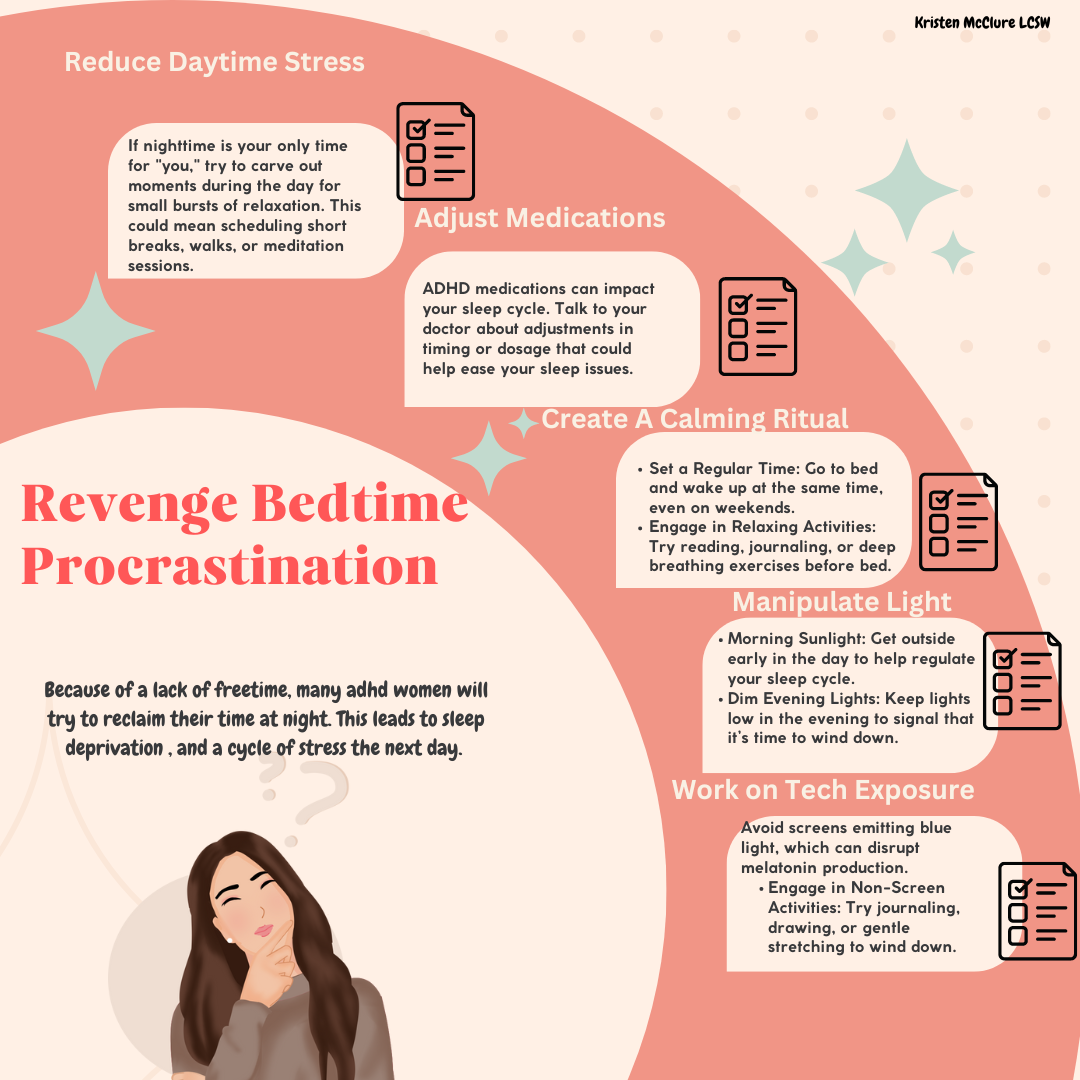Using Self-Talk to Manage RSD for ADHD Women
Why Self-Talk and Externalizing Language are Essential for Emotional Regulation

I've found self talk to manage RSD a crucial strategy for the ADHD women I work with. I often hear from ADHD women they are overwhelmed during episodes of Rejection Sensitive Dysphoria (RSD) and need immediate assistance. RSD can make even small rejections feel like a crushing wave of shame, anger, or hopelessness. A strategy that's always available and helps immediately is key.
Understanding Self-Talk: How It Works for RSD
Self-distancing techniques like self-talk involve the inner dialogue we use to process what’s going on around us. When an RSD episode hits, that inner voice often becomes harsh, feeding into feelings of worthlessness or rejection. From my experience working with ADHD clients, I know that using externalizing language—referring to yourself in the third person—can disrupt this negative spiral. Instead of getting stuck in the “I’m not good enough” loop, you create distance from the emotion, which gives you the mental space to breathe and gain control again.
Externalizing Language and Emotional Regulation: A Key Technique for ADHD Women
I’ve worked with many clients who find relief by using emotional regulation techniques like externalizing language. It helps you create emotional distance by referring to yourself in the third person. For example, saying “Kristen feels overwhelmed right now” instead of “I’m overwhelmed” allows you to observe your feelings from the outside. It’s a technique I’ve seen help my clients manage ADHD rejection triggers more effectively, especially in moments where emotional responses feel overwhelming. The good news is that self-talk to manage rsd is always available.
Why Externalizing Self-Talk Works for ADHD Women
ADHD brains can quickly get stuck in the heat of the moment. Coping strategies for ADHD, like self-talk, help tone down emotional intensity. By framing your emotions as something outside of yourself, it becomes easier to approach the situation logically rather than feeling consumed by the moment. This shift helps my clients regulate their emotions and deal with ADHD and emotional sensitivity more calmly.
Building the Habit of Externalizing Self Talk: Practice and Patience
Building this habit takes time, but it’s worth the effort. Start by using self-distancing techniques in low-stress situations, like when dealing with everyday frustrations. Over time, this skill will strengthen your ability to manage more intense emotional reactions, including RSD episodes. Just like training a muscle, it takes practice and patience. The more often you use these emotional regulation techniques, the easier it becomes to handle your feelings during ADHD emotional overwhelm.
Research-Backed Self-Talk Strategies for Managing RSD
Research shows that self-distancing techniques help manage overwhelming emotions by creating psychological distance from them. This is especially important for ADHD women dealing with rejection sensitivity. Studies show that using your name during self-talk reduces the emotional intensity of rejection or criticism, making it easier to think rationally and calmly.
How can you apply this during a severe RSD episode?
During a Rejection Sensitive Dysphoria episode, emotions can feel all-consuming. I encourage clients to reframe those extreme thoughts. For example, instead of saying, “I’m a failure,” try externalizing: “Kristen feels like a failure right now, but this is just a feeling—it will pass.” This perspective allows you to manage rejection sensitivity more effectively, creating the mental space needed to calm down.
Applying Self-Talk During RSD Episodes: Step-by-Step Guide
Step 1: Recognizing the Emotional Flood The first step in managing RSD is recognizing when you feel emotionally overwhelmed. When ADHD emotional overwhelm strikes, externalizing the emotion helps reduce its power.
Example: Instead of, “I’m completely overwhelmed,” try, “Kristen is feeling overwhelmed right now, but she’s safe.”
Step 2: Reframing Extreme Thoughts Once you recognize the emotional flood, reframe your thoughts using externalizing language. Instead of thinking, “I’m a failure,” say, “Kristen feels like a failure right now, but this is just one moment—it doesn’t define her.” This technique helps manage ADHD rejection triggers and puts the situation into perspective.
Step 3: Creating a Pause for Reflection and Calm I often remind clients to create a pause when emotions are high. This is where mindfulness and ADHD practices like deep breathing or grounding exercises come in handy.
Example: “Kristen, take a breath. You’ve been through this before and will get through it again.” This technique allows you to stay present and grounded during an emotional episode.
Building Your Self-Talk Toolkit for Intense RSD Moments
Having a set of personalized self-talk phrases ready can make it easier to navigate RSD episodes. These phrases should feel comfortable and easy to remember during high-stress moments. Be careful not to invalidate your feelings.
Examples:
- “Kristen, this moment doesn’t define who you are.”
- “Kristen, you’ve felt rejected before, and you got through it. You will this time too.”
- “Kristen, of course you feel this way! It’s okay to feel hurt, but remember, this will pass.”
Beyond RSD: Strengthening Emotional Resilience with Self-Talk
While externalizing language is beneficial during RSD episodes, it’s just as effective during other emotional overwhelms. By practicing these techniques regularly—whether you’re anxious, frustrated, or angry—you’ll build the emotional resilience needed to manage all types of stress. It’s like working out—every time you use these techniques, you strengthen that emotional muscle.
Conclusion: Why Self-Talk Is a Powerful Tool for Managing RSD
I’ve seen firsthand how emotional regulation techniques like externalizing language help clients during RSD episodes. By creating distance between yourself and your emotions, you can clearly manage overwhelming feelings. With practice and patience, this tool will become easier to use and help build your emotional resilience over time.
There are a lot of pages here to check out! Here are a few that might be pertinent to this post
References
Hong, S. B., Kwak, Y. S., Park, H. S., Kang, H., & Son, Y. D. (2021). The effects of positive or negative self-talk on the alteration of brain functional connectivity by performing cognitive tasks. Scientific Reports, 11, 14563. https://doi.org/10.1038/s41598-021-94328-9
Kross, E., Bruehlman-Senecal, E., Park, J., Burson, A., Dougherty, A., Shablack, H., Bremner, R., Moser, J., & Ayduk, Ö. (2014). Self-talk as a regulatory mechanism: How you do it matters. Journal of Personality and Social Psychology, 106(2), 304-324. https://selfcontrol.psych.lsa.umich.edu/wp-content/uploads/2014/01/KrossJ_Pers_Soc_Psychol2014Self-talk_as_a_regulatory_mechanism_How_you_do_it_matters.pdf





